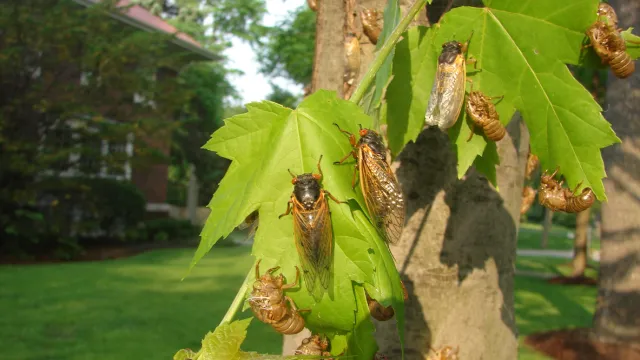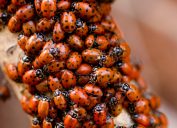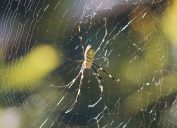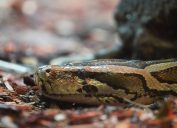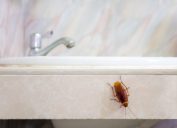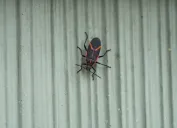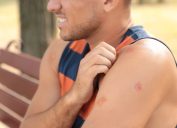Cicada "Double Brood" Will Descend on These 16 States Next Month
A double emergence of this nature hasn't occurred since 1803.
Some will argue that the buzzing sound of cicadas signals the unofficial start of summer—however, this year you may be better off investing in a pair of noise-cancelling headphones. For the first time in 221 years, two different broods of periodical cicadas will simultaneously unleash themselves on one-third of the U.S. in what some are calling a "cicada apocalypse." And now, experts predict the frenzy could occur as early as next month.
RELATED: Doctors Keep Finding Spiders in People's Ears—These Are the Tell-Tale Symptoms.
Brood XIII and Brood XIX are the cicada species behind the double emergence, according to ScienceAlert. This year marks Brood XIII's ("Northern Illinois Brood") first appearance since 2007, while Brood XIX ("Great Southern Brood") was last seen 13 years ago.
As alluded in its name, Brood XIII, or the "Northern Illinois Brood," will make itself known primarily in the Midwest—Iowa, Wisconsin, Illinois, Indiana, and Michigan to be exact, per Cicada Mania. Brood XIX, on the other hand, will cover a lot more ground, emerging in 14 different states: Alabama, Arkansas, Georgia, Illinois, Indiana, Kentucky, Louisiana, Missouri, Mississippi, North Carolina, Oklahoma, South Carolina, Tennessee, and Virginia.
Residents of Illinois and Indiana are in for a very special treat, as they'll be invaded by both broods.
ScienceAlert previously reported that Brood XIII and Brood XIX would emerge from the soil between May and June 2024. However, biology and wildlife experts are now saying that the cicadas will realistically start popping up at the end of April.
"We're expecting the periodical cicadas to start emerging in the last week of April at the southern end of their distribution, which is across Northern Louisiana, Northern Mississippi, Northern Alabama, and Georgia," Gene Kritsky, PhD, a professor emeritus of biology at Mount Saint Joseph University, told People.
As for Brood XIX's debut, Kritsky said it "could happen as early as the last week of April into the first week of May."
Regions with cicada overlap will have some time before Brood XIII makes its grand entrance, which isn't expected to hit until "the last week of May," Kritsky noted. But even then, that time frame is still earlier than when the brood last emerged in June 2007.
RELATED: Invasive Ladybugs Are Spreading and Excreting "Foul-Smelling" Blood—How to Keep Them Out.
The reason for the difference between Brood XIII and Brood XIX's emergence has to do with the soil's temperature. Sixty-four degrees Fahrenheit is the sweet spot, according to Kritsky and wildlife filmmaker Steve Nicholls. Once the soil hits this temperature, the baby cicadas or "nymphs" will shed their exoskeletons and emerge as adults, per ScienceAlert.
But as Kritsky noted, the emergence isn't a one-day process. "It's not like all or none; it takes two weeks for all the cicadas to come out in a given location," he explained to People.
Once above ground, cicadas have about a one-month shelf-life. From start to finish, cicadas will "be present in their emergence areas for about six weeks altogether," Kritsky explained.
A six-week reign of cicadas may sound terrifying, especially for those in the overlap zone, but Kritsky said it's more of a fun fact than a warning.
"I think people are expecting to see double the cicadas, a cicada apocalypse or Armageddon," he said, noting that won't be the case. "It's a very narrow area. Moreover, it's at the extreme edge of both broods. And at the edges of the broods, that's where the numbers aren't as great."
Although a viral tornado of flying loud insects might give you the heebie-jeebies, it would be a once-in-a-lifetime thing to witness. The incredibly rare lineup won't happen again until 2445.
